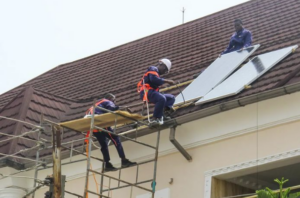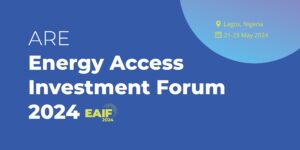EAIF 2024 host Nigeria is powering its future through decentralised renewable energy
Nigeria, being one of the largest economies in Africa and one of the fastest-growing populations globally, still faces a huge gap in energy access. Nevertheless, its vast natural resources offer the possibility to develop decentralised renewable energy (DRE) projects to power communities. There are already different national plans in place aimed at reducing the gap and attaining 2030’s objectives.
According to the World Bank, 85 million Nigerians, 45% of the population, still lack access to the electricity grid. Large disparities exist in access to electricity between urban areas (84%) and rural ones (26%). Power deficit affects households, businesses, and key public buildings such as hospitals. It is estimated that 40% of primary health centres, which mainly serve rural areas, lack enough power to conduct standard operation procedures.
Addressing this issue has been one of the top priorities on the government’s agenda for a long time. In 2003, the World Bank launched the Nigeria Electrification Project (NEP) aimed at providing off-grid electricity access throughout the country. To achieve NEP’s goals, the Distributed Access through Renewable Energy (DARES) programme was set up in 2021 to expand or improve renewable energy access for 17.5 million Nigerians.
The programme’s primary focus was to enhance community development, foster job creation and address gender-based inequalities. Notably, it dedicated specific efforts to providing electricity to marginalised households headed by women and supporting women-led MSMEs, while also striving to increase female employment in the energy sector. To accomplish these goals, the deployment of decentralised solutions emerged as the most fitting approach.

Source: Ashipa Electric
To achieve these objectives, DARES has supported the installation of DRE solar based systems, which, apart from providing access to electricity, led to the creation of over 5,000 private-sector local green jobs in Nigeria. Additionally, there is a wide variety of energy programmes already set in place to support DARES. Many of them focus on improving capacity building, developing tailored solutions and ensuring efficient and clean energy access. One of the most recent ones launched in the solar sector is the Nigeria Off-grid Solar Knowledge Hub, which is dedicated to closing the skills gap and increasing training and skills development in rural areas.
A study conducted by IRENA concluded that Nigeria has a huge potential DRE market whether based on solar photovoltaic (PV) mini-grids or through solar home systems. Furthermore, the SEforALL Action Agenda outlined crucial aspects of the country’s renewable energy potential, market, policies and barriers to overcome in order to achieve the goals set for 2030. One of the objectives is to reach 30 GW of electricity, with a renewable energy share comprising of 30% of the total energy mix.
According to SEforALL (2023), thanks to these initiatives, universal electrification in Nigeria will result in 5 million solar home systems in sparsely populated areas and 8.9 million mini-grid connections in more densely populated areas that will bring energy to 19.3 million people. The country will be able to ensure energy access and further develop its renewable energy market.
Moreover, Nigeria’s commitment to sustainable electrification is underscored by its role as the host of ARE’s Energy Access Investment Forum 2024. This premier annual event brings together key stakeholders in the renewable electrification sector, facilitating partnerships between businesses and investors. With a focus on sustainable electricity access, decarbonisation, economic growth, and climate change mitigation, the forum’s agenda includes dedicated sessions highlighting Nigeria’s efforts and potential in the renewable energy landscape.

Join us on 21-23 May 2024 as we accelerate clean energy financing, unlock fresh opportunities, and chart the course towards universal energy access!
